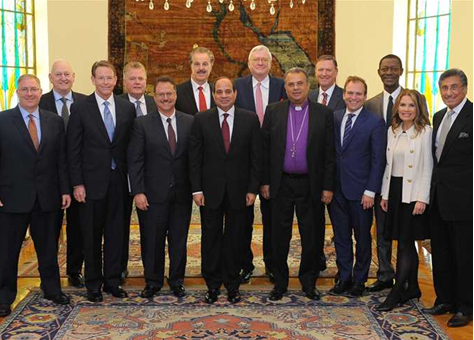By Coptic Solidarity –
 On November 1, a group of American Evangelical leaders made history by becoming the first such delegation to meet with Egyptian President el-Sisi. The three-hour-long meeting was attended by Dr. Andrea Zaki, the President of the Council of Protestant Churches in Egypt, which represents almost one million Protestants in the country, and curiously by General Khalid Fawzi, the Chief of Egyptian Intelligence.
On November 1, a group of American Evangelical leaders made history by becoming the first such delegation to meet with Egyptian President el-Sisi. The three-hour-long meeting was attended by Dr. Andrea Zaki, the President of the Council of Protestant Churches in Egypt, which represents almost one million Protestants in the country, and curiously by General Khalid Fawzi, the Chief of Egyptian Intelligence.
Delegation leader, Joel C. Rosenberg, an Evangelical author and activist who resides in Jerusalem, wrote a glowing review of the meeting and promised further updates. Rosenberg had previously met with el-Sisi during his visit to Washington, D.C. in April 2017 and was clearly star- struck.
He wrote about el-Sisi’s deep admiration of former president, Anwar al-Sadat, and of the current Egyptian president’s stated desire to emulate Sadat in building greater peace with Israel. Likewise, Rosenberg has written about el-Sisi’s desire to rebrand Egypt as a friend of the U.S. and as a stable and strategic partner; he has further declared, as have some conservatives, that el-Sisi is willing to tackle terrorist groups, from the Muslim Brotherhood to the Islamic State (ISIS). Behind that lies the oft-repeated Egyptian government’s argument to its supporters that it needs “U.S. support” to successfully prosecute its war on terrorism—which is code for needing the same if not more U.S. foreign aid. The official Egyptian government line is that they must first defeat the terrorists; then they can focus on internal issues such as civil society, religious freedom, and human rights—as if somehow, they are mutually exclusive. The reality is that the war on terrorism needs to be fought less in military battles and more within Egypt and Saudi Arabia, against institutions such as al-Azhar which has resisted reform and continued to promote the totalitarian hate ideology of Salafi and Wahabi Islamists which produce intolerance and terrorism. Sisi’s call for reform of Islamic religious discourse have been just that, and failed to translate into action.
While their intentions were most certainly good, the delegation’s Evangelical leaders have unwittingly become a useful tool in the Egyptian government’s public relations campaign that aims to regain US financial aid that has been withheld without having to instate measures to promote human rights, civil society or religious freedom. Firstly, the timing of the delegation’s visit coincides with Egypt’s parliamentary delegation visit to the US Congress whose goal is to convince US legislators that Egypt respects human rights. This, despite findings of several recently published excellent studies by the Project On Middle East Democracy (POMED) demonstrating the Anti-democratic nature of the current Egyptian parliament and the many bills they have passed and are considering which prove that the Egyptian government is pursuing policies directly contrary to that of a nation that protects and promotes equality, freedom, and safety for all its citizens. Secondly, by hosting a delegation of Evangelical leaders, the Egyptian government is trying to appear committed to human rights and religious freedom even though all its actions are to the contrary. Notably, US foreign aid to Egypt would not have been withheld without the support of key Republicans. What better way to appeal to conservatives’ good graces than to host high profile delegation of conservative religious leaders in Egypt?
Meanwhile, those who have closely followed el-Sisi’s term as president, recognize that while he says what he knows Western leaders expect him to say, he has failed to deliver in actions. To the contrary, he has demolished civil society, jailed journalists and Islamic reformers and thinkers, silenced the voices of the moderates, allowed fundamentalist Islamist teachings of the Salafis to spread unchallenged, permitted the surge in the violence against Christians and other religious minorities and failed to protect them, and vociferously targeted the small LGBT community, among many other moves to consolidate his power in a fashion typical of military dictators.
Regardless, Mr. Rosenberg parroted the very same line that the Egyptian government has been stating since Morsi’s removal. The argument focuses on Morsi’s efforts to consolidate power for the Muslim Brotherhood, the destruction of churches, and lack of religious freedom for minorities. The West and Copts in Egypt are repeatedly told that el-Sisi is the only viable alternative to Morsi and the Muslim Brotherhood and they must support him or the situation would deteriorate.
Coptic Solidarity has recently published an article detailing how the persecution of Copts and attacks on civil society have gotten worse under el-Sisi’s rule. Morsi’s one-year rule has long since ended and Sisi has had ample time to implement reforms and bring Christian Egyptians out of their marginalized second-class status to their rightful place as equal citizens in their own country.
Sisi’s hero, Sadat, was the Egyptian leader who introduced Sharia as the main source of law in Egypt’s constitution; who placed Pope Shenouda III under house arrest in the desert monastery of St. Bishoy away from his flock for forty months; who put over five hundred journalists in jail in the same episode: who did not hesitate to call himself a “Muslim president of a Muslim nation,” intentionally excluding the rest of the, mostly Coptic Christian, Egyptians; and who opened Egypt’s door for Saudi Arabia’s Wahabi Islamic extremist ideology allowing Salafists to plant deep roots in Egypt. The origin of the modern hate culture against non -Sunni Muslims can be traced to these developments, when Islamist imams began preaching hate against religious minorities, when educational curricula removed six centuries of Coptic history and started denigrating Jews and Christians, and when attacks on Copts started to rise. While some Americans politicians focus on Sadat’s peace treaty with Israel—which is ironically supported only by moderates, not Islamists—they have turned a blind eye to the devastating impact that his beliefs and policies had on Egyptian society in general, and religious minorities in particular. Furthermore, Egypt’s peace treaty with Israel has devolved into a cold co-existence and failed to achieve the economic co-operation and cultural exchange it was meant to achieve primarily because of the prevailing Islamist fundamentalist hate culture that has reigned in Egypt.
El -Sisi wins accolades among some American politicians by demonizing the Muslim Brotherhood with whom his struggle is entirely political not ideological, while giving the even more radical Salafis free reign in Egypt. Their partnership is such that, the visibly pious Salafis confer Islamic legitimacy on his rule, and in exchange he allows their ideology, which is equally if not more hateful and intolerant towards Christians, Jews and secularists than the Brotherhood’s, to infiltrate every level of society, including the media, public education and, of course, mosques.
Just prior to el-Sisi’s April 2017 visit to the U.S., the Coptic Patriarch Pope Tawadros II and Rev. Andrea Zaki, President of the Council of Protestant Churches sent letters to US members of Congress stating their support for el-Sisi and declaring that the situation of Christians in Egypt has improved, despite evidence to the contrary. The Egyptian government has exerted maximum pressure on the most visible Christian leaders in Egypt to provide statements and letters that tow its line and can be used as fodder in its public relations campaign to create a false reality for Americans that does not exist in Egypt.
The same tactics have been applied to some Members of US Congress who visited Egypt earlier this year, who had carefully monitored meetings with church officials, and others, and heard the message that el-Sisi wanted conveyed. It is not surprising that some members returned from these trips whole heartedly supporting the Egyptian government and willing to uncritically believe in what they were told.
Make no mistake; these are all orchestrated steps in a savvy public relations campaign launched by Egyptian General Intelligence, which has spent millions of dollars to hire US lobbying firms to work on its behalf.
Surely members of the American Evangelical delegation would not want to be pawns in the Egyptian government’s public relations campaign. If they truly want to help persecuted Christians in Egypt, they should first acquaint themselves with facts, and not take the Egyptian government’s propaganda or coerced statements by church officials who are hostage to Sisi’s regime at face value. There is a plethora of information available concerning the reality of conditions of the Copts and civil society in Egypt. There are numerous sources of information independent of Coptic Solidarity from which members of the Evangelical delegation can obtain actual facts such as the Project on Middle East Democracy, Freedom House, Human Rights Watch, The Cairo Institute for Human Rights Studies, World Watch Monitor, and International Christian Concern.
Finally, one hopes that the prestige and fame of meeting the Egyptian president does not come at the cost of sacrificing the lives and wellbeing of Egypt’s Christians.
_________________
Photo Credit: Feature Image – CBN
Photo Credit: Image of Delegation Standing – Joel C. Rosenberg Blog




